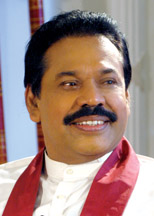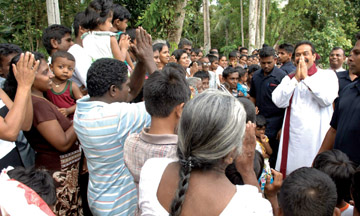Common touch won him the top job
by Lionel Yodhasinghe
 A friend in my village who had boycotted elections earlier was
disappointed over the way the political leadership treated the common
man in this country, met me at the voting centre on the last
presidential election day November 18. A friend in my village who had boycotted elections earlier was
disappointed over the way the political leadership treated the common
man in this country, met me at the voting centre on the last
presidential election day November 18.
"Don't be surprised, I came to fulfil a national task, that is to
give a historic vote to elect a representative of a calibre we need", he
said.
My friend became jubilant the following day with news of the election
of that man of the masses as the first citizen of this country and his
swearing-in as the fifth executive President of Sri Lanka.
There is truth in my friend's argument to say that since independence
many political leaders emerged from aristocratic and elite families who
made false election pledges to gain political power. They used such
power for family prestige and international fame rather than working to
make redress to the suffering masses.
The direct beneficiaries in such power circles were always the
members of a family tree and others who became their friends and
well-wishers to those maintained equal social contacts.
The new generation, who felt the bitter consequences of the
constitutional change led by former President late J. R. Jayewardene in
1978 realised this political card play and used their ballot to punish
many leaders. Leaders of all parties had to change their old gimmicks,
and those who stuck to old habits faded away from the scene or were
defeated consecutively, good food for thought for the politicians of a
new generation.
In this backdrop, President Rajapaksa has been engaged in politics
actively during this period. He shaped up his political character by
maintaining close touch with the people.
Hard working, commitment and firm policies stood as strong pillars
for him to walk among the people not only in Hambantota but also in
other parts of Sri Lanka.
 The harvest from what he sow during over 35 years of political career
was his election to the top political position of this country, and
today the nation marks his completion of one year in office, a good
opportunity for people to pass judgements on him and his performance. The harvest from what he sow during over 35 years of political career
was his election to the top political position of this country, and
today the nation marks his completion of one year in office, a good
opportunity for people to pass judgements on him and his performance.
Amidst manifold obstacles, on one hand tackling a ruthless terrorist
organisation and on the other hand directing a massive economic
development, his career as the executive president is no doubt daunting.
There are several major achievements to his credit reported within one
year. President Rajapaksa addressed the Non Aligned Summit and
subsequently the United Nations Assembly within a short spell after
assuming office.
Another achievement is his ability to push the international
community to bring the LTTE to the negotiating table twice within a
year. Many talk about the failure of the Geneva Talks, but it is
President Rajapaksa's political prowess that made such scenario to break
the deadlock of stalled talks and push the Tigers to Geneva.
In the face of escalating LTTE violence against security forces and
civilians, the national security in the country was in question when
President Rajapaksa took office last November. His decision to prevent
any threat to the national security by destroying illegal arms smuggling
and ordering security forces to retaliate in self defence boosted the
morale of the forces.
Ordinary people with national responsibility would acclaim this act
as any peace - loving person expect from the leadership to protect the
sovereignty and national integrity of the nation. Since the day former
Premier late S. W. R. D. Bandaranaike walked out from the United
National Party to form the Sri Lanka Freedom Party, the political
rivalry emerged with grave consequences. Coupled with the introduction
of the preferential vote system, which even led some supporters to kill
each other, is the bitter truth of the political history of this
country.
Opposing the policies of the rival party whether the policies were
helpful to development was no matter during that time. This pathetic
political culture saw new light at the end of a 57-year-long tunnel
recently when President Rajapaksa invited Opposition Leader Ranil
Wickremesinghe to join in his efforts for peace and development.
As the people have paid heavy price for this division and political
bickering, many social and economic stumbling stood in the way of our
nation. And for over five decades, no politician was able to bring the
two main parties into a common consensus, but for President Mahinda
Rajapaksa.
His victory in uniting the divided two major parties, and obtaining
the blessings of the minor political parties in the effort of finding a
lasting solution to the national conflict is the victory of the entire
nation. This would no doubt be enshrined in the local political history.
The success of any leader depends on his or her ability to run a
smooth adminstration while maintaining the aspirations of the common
man. President Rajapaksa did not want to cultivate this quality anew in
him as his forte is redressing the common man. He neither forgot his
childhood experience in Medamullana nor his political exercise in
Hambantota district after he stepped into the President's House.
Taking his time off, despite busy schedules, he appears at the
funeral of a dead soldier in a far away village and shares the grief
with the relatives. Visiting an old ailing friend somewhere else, and
even break from his security detail to reach a wedding ceremony of a
fellow townsman in a city hotel gave him happiness.
His scope of thinking has turned many into friends. As a young
reporter, I had the privilege to cover him when he was the Minister of
Labour and Vocational Training to the Daily News in 1994.
During my short spell of reportage in his constituency in Hambantota,
I realised that his strategies to beat the rivals were enriched from the
teachings of the Buddha, his qualities of compassion, kindness and
respect.
Even certain media who concocted stories and diabolical lies with
malice intending to sling mud have admitted their defeat in the face of
strong people's mandate.
This stand is clear evidence to President Rajapaksa's wide spectrum
of political thinking that a true politician should possess to lead a
nation towards peace and prosperity. Our masses have been clamouring for
strong and competent leaders to take decisions whenever the need arises.
The tsunami devastation was one best example where the masses felt
the need of such a leader after deadly waves washed away the life and
property in a split second. President Rajapaksa, as the Prime Minister
at that time was the only leader who remained at home to do his best
while many others were on foreign jaunts.
Tsunami was one national tragedies that demonstrated clearly with
whom the nation should walk with. My friend at the voting centre is one
among the 4.9 million voters who proved that the track was right. ..................................
<<
BACK to Main Page |



 A friend in my village who had boycotted elections earlier was
disappointed over the way the political leadership treated the common
man in this country, met me at the voting centre on the last
presidential election day November 18.
A friend in my village who had boycotted elections earlier was
disappointed over the way the political leadership treated the common
man in this country, met me at the voting centre on the last
presidential election day November 18.  The harvest from what he sow during over 35 years of political career
was his election to the top political position of this country, and
today the nation marks his completion of one year in office, a good
opportunity for people to pass judgements on him and his performance.
The harvest from what he sow during over 35 years of political career
was his election to the top political position of this country, and
today the nation marks his completion of one year in office, a good
opportunity for people to pass judgements on him and his performance.








